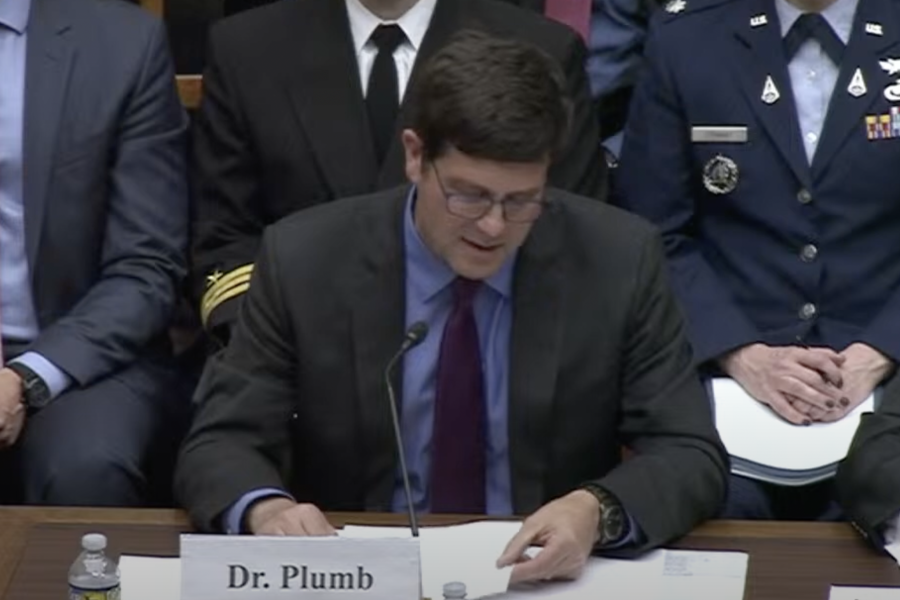A senior Pentagon official warned lawmakers that Russia is developing an “indiscriminate” nuclear weapon to go in space, confirming reports from several months ago and describing potentially devastating effects in orbit.
“The concept that we are concerned about is Russia developing, if we are unable to convince them otherwise, to ultimately fly a nuclear weapon in space, which would be an indiscriminate weapon,” said Assistant Secretary of Defense for Space Policy John F. Plumb at a House Armed Services Committee hearing.
In February, Rep. Mike Turner (R-Ohio), the chair of the House Intelligence Committee, issued a statement warning of a “serious national security threat.” White House National Security Council spokesman John Kirby then confirmed media reports that the danger involved an anti-satellite weapon the Russians have been developing, which would violate an international treaty that bans the deployment of nuclear weapons in space.
Various Pentagon officials subsequently warned of the widespread destruction a nuke could wreak in space, without outright saying that the Russians were developing such a weapon. Space Development Agency director Derek M. Tournear, for example, noted that detonating a nuclear weapon in space would destroy commercial, civil, and military satellites and constitute an “attack on the world.”
Plumb offered even more detail, saying in his written testimony that such a weapon “could pose a threat to all satellites operated by countries and companies around the globe, as well as to the vital communications, scientific, meteorological, agricultural, commercial, and national security services.”
In low-Earth orbit (LEO) in particular, Plumb cautioned most satellites aren’t hardened against a nuclear detonation, making them especially vulnerable to damage. The outcome could vary based on factors like the detonation type and location, but satellites in the blast zone would likely be destroyed. He also suggested a sufficiently powerful nuclear detonation in the right location could render LEO unusable for up to a year.
“It is not imminent in the way that we should have to worry about it right now, but we are concerned about it,” said Plumb. “The department and the entire administration, and I know this Congress is taking this deadly seriously.”
The U.S. has a significant number of satellites in LEO, both civil and military, like the Space Development Agency’s Proliferated Warfighting Space Architecture and SpaceX’s Starlink constellation.
“And those could be what a Russian weapon system might be trying to counter, is that proliferated, architecture that we’re seeing used so well in Ukraine and as part of our overall architecture moving forward for the United States,” Charles Galbreath, senior fellow at the Mitchell Institute for Aerospace Studies, told Air & Space Forces Magazine in February.
In addition to military and commercial satellite damage, Galbreath cautioned of potential indirect effects from the detonation, referencing the Cold War-era “Starfish Prime” test. In 1962, the U.S. detonated a nuclear weapon in low-Earth orbit, disabling eight out of 24 satellites and causing a power blackout in Hawaii.
Russian President Vladimir Putin has denied any intention to deploy nuclear weapons in space. However, Russia recently vetoed a U.N. Security Council resolution, co-proposed by the U.S. and Japan, urging Member States not to develop such weapons. Russia’s U.N. Ambassador cited the resolution’s inadequacy in banning all space weapons as the reason for the veto.
Moscow is now considering proposing a resolution calling on all nations to urgently prevent the placement of any weapons in outer space “for all time,” according to the Associated Press.
Earlier this week, Secretary of Defense Lloyd J. Austin III said if a nuclear device were detonated today in outer space, it would have “devastating consequences,” and that it’s “irresponsible for anybody to even consider deploying or employing a nuclear device in space.” Austin was addressing a lawmaker’s question regarding Russia’s veto and China’s abstention of the U.N. proposal by the U.S. and Japan, at a separate House Armed Services Committee hearing. Plumb also criticized Moscow and Beijing’s stance at the U.N., calling it “hypocritical and unbelievable,” given the nations’ continued development and fielding of counterspace weapons.
